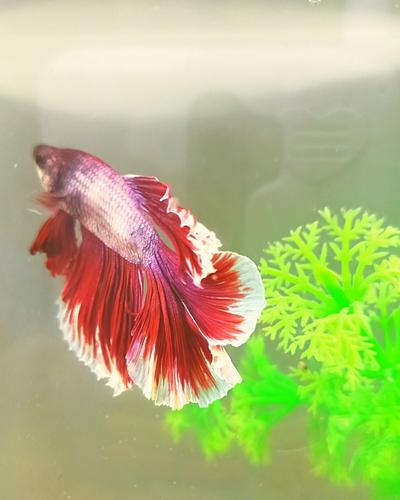Can betta fish breathe air? Betta, or Siamese fighting fish, are popular pets for their vibrant colors and flowing fins. In addition to their stunning appearance, betta fish have unique abilities that set them apart from other freshwater fish. One of these remarkable abilities is their capacity to breathe air.
Unlike most fish, bettas have a labyrinth organ, which allows them to take in oxygen from the air above the water’s surface.
This adaptation enables them to survive in oxygen-deprived environments, making them a popular choice for small, unfiltered fish tanks.

Betta fish are also known to rise to the surface of the water to gulp air, which is an instinctual behavior that helps them thrive in their natural habitat of shallow, stagnant waters.
In this definitive fish keepers guide, we will explore the fascinating abilities of betta fish and delve into the reasons behind their unique respiratory system. We will also discuss how betta owners can ensure their pets have the best living conditions to use their extraordinary air-breathing capabilities.
Table of Contents
ToggleWhy Is My Betta Fish Gasping for Air?
Why do fighting fish breathe air? If your betta fish is gasping for air, it may indicate a problem with the water in its tank. Betta fish require clean, well-oxygenated water to thrive, and if the water becomes polluted or oxygen-deprived, they may exhibit signs of distress, such as gasping.

One common cause of this behavior is poor water quality, overfeeding, overstocking the tank, or inadequate filtration. It is essential to test the water regularly and take steps to ensure that it is within the appropriate parameters for betta fish.
Another potential cause of gasping behavior is a lack of dissolved oxygen in the water, which can occur if the tank is not aerated correctly or if there is a buildup of harmful chemicals such as ammonia. Addressing the issue’s root cause is essential to ensure your betta fish’s health and well-being.
Can Betta Fish Breathe Air?
Yes, Betta fish can breathe air! They are unique because they have both gills, like other fish species, and a special labyrinth organ. This labyrinth organ acts like a primitive lung, allowing them to extract oxygen directly from the air.

That’s why you often see Betta fish swimming up to the surface and taking “gulps” of air. This is perfectly normal and healthy behavior! Their ability to breathe air allows them to thrive in environments with low oxygen levels, such as rice paddies and stagnant ponds, where other fish struggle.
Here are some critical points about Betta fish and air breathing:
- They can still breathe through their gills: While the labyrinth organ is essential, Betta fish also get oxygen like other fish.
- Frequency of air gulps varies: They don’t need to breathe air constantly, and their air gulps will depend on factors like water temperature, oxygen levels, and activity level.
- Not a sign of water quality issues: Seeing your Betta fish breathe air isn’t necessarily a sign of poor water quality in their tank. However, if they’re gasping for air more frequently than usual, it could cause concern.
Overall, the ability to breathe air is a fascinating adaptation that makes Betta fish such hardy and resilient creatures. So, if you see your Betta fish taking a break at the surface to breathe, rest assured that they’re just doing what comes naturally to them!
Can Bettas Survive Out of Water?
Yes, Bettas can survive out of water for a short period of time, but their ability to do so is limited. Bettas have a specialized organ called the labyrinth, which allows them to breathe air from the surface.
This means that Betta fish can survive outside the water if their labyrinth organ remains moist. However, they are still highly dependent on water for their health and well-being.
Being out of water for too long can cause stress and dehydration, leading to potential health issues or even death. It is essential to always keep Bettas in a properly maintained aquarium with clean water and a secure lid to prevent them from jumping out.
While they may be able to survive out of water for a short period, it’s crucial to maintain the proper conditions for them within their aquatic environment.
How Long Can A Betta Fish Live Out Of Water?
Unfortunately, betta fish cannot live for very long outside of water. While they are special in that they have a labyrinthine organ that allows them to gulp air at the surface, they still rely primarily on water for respiration and survival.
Their out-of-water survival time can vary depending on factors like humidity, temperature, and overall health, but it’s generally very short:
- Most estimates range from just a few minutes to an hour.
- Longer times are infrequent and depend on ideal conditions.
Therefore, always keeping your betta fish submerged in clean, well-maintained water is crucial. If your fish ever jumps out, immediately return it to the tank, ensuring their gills are wet. If they seem sluggish or distressed, observe them closely and consider contacting a veterinarian if worried.
Why Do Betta Fish Need a Labyrinth Organ?
Betta fish, need a labyrinth organ because they inhabit shallow, oxygen-deprived waters in the wild. This unique organ allows them to breathe oxygen directly from the air at the water’s surface and absorb oxygen from the water through their gills.
This adaptation gives them a survival advantage in their natural habitat, where oxygen levels can fluctuate due to temperature, water movement, and organic waste buildup. Betta fish would struggle to survive in these challenging conditions without the labyrinth organ.
In a home aquarium, the labyrinth organ allows betta fish to breathe air when necessary, which can be particularly important in tanks with poor water circulation or inadequate oxygen levels.
Therefore, it is essential for betta fish owners to provide their pets with access to the water’s surface, as well as proper water quality and aeration, to support their unique respiratory needs.
How Do Bettas Use Their Labyrinth Organ to Build Bubble Nests?
The bubble nest, a cluster of tiny bubbles meticulously arranged at the water’s surface, is an iconic symbol of the male betta fish. But how do these feisty fighters create these delicate structures? The secret lies in a fascinating adaptation called the labyrinth organ.
The Mighty Labyrinth: Imagine a complex maze of thin, bony plates covered in a membrane rich in blood vessels. That’s the labyrinth organ located above the Betta’s gills. It allows them to breathe air directly from the surface, a crucial adaptation for surviving in oxygen-depleted rice paddies and shallow pools.
Bubble Blowing Powerhouse: When it’s time to build a nest, the labyrinth organ takes on a new role. The Betta takes a deep gulp of air, then traps it within the labyrinth’s chambers. Contracting muscles around the organ force the air out through their mouth, coating it with a sticky mucus secretion. This creates a single, durable bubble.
Nest-Building Artistry: The Betta repeats this process, meticulously placing each bubble next to the previous one, often anchoring them to plants or other objects. Their saliva acts like glue, preventing the bubbles from popping and ensuring the nest’s stability.
A Labor of Love: Building a bubble nest can take hours, showcasing the dedication of male bettas to their reproductive success. The nest is a haven for fertilized eggs, protected from predators and currents. The male will tirelessly guard the nest and care for the fry after they hatch.
Beyond Bubbles: The labyrinth organ’s abilities extend beyond nest building. It plays a vital role in the Betta’s overall health and survival. By allowing them to breathe air, the labyrinth organ helps them tolerate poor water quality and survive in environments with limited oxygen.
So, the next time you see a betta tending to its bubble nest, remember the incredible labyrinth organ working silently behind the scenes. This remarkable adaptation is a testament to the ingenuity of nature and the unwavering parental instincts of these captivating fish.
Do Betta Fish Need Air Pumps?
No, betta fish typically do not need air pumps. Bettas are labyrinth fish, meaning they have a unique organ called a labyrinth lung that allows them to breathe air directly from the water’s surface. Strong water currents from air pumps stress bettas out.
However, there are a few exceptions:
- If your betta tank is heavily stocked, underplanted, or has poor water circulation, an air pump may be helpful to increase oxygen levels.
- If your Betta is sick or injured, they may have difficulty breathing from the surface, and an air pump can provide additional oxygen.
- If you have a tiny tank (less than 2.5 gallons), an air pump may be necessary to ensure adequate oxygenation.
If you decide to use an air pump with your Betta, be sure to adjust the airflow so that it is gentle and does not create strong currents. You can also use an air stone to diffuse the bubbles and make them less disruptive.
Can Betta Fish Live Without a Filter or Air Pump?
Betta fish can technically live without a filter or air pump, but it is not ideal for their overall health and wellbeing. In the wild, betta fish live in shallow, slow-moving waters with access to plenty of oxygen from the surface.
In a home aquarium, however, a filter and air pump help to maintain water quality and oxygen levels, which are essential for the betta fish’s survival. Without a filter, the water in the fish tank can become polluted with waste and harmful chemicals, leading to poor water quality and stress for the fish.
Likewise, an air pump helps to aerate the water, providing oxygen for the fish. While betta fish can technically survive without a filter or air pump, their quality of life and longevity will be significantly improved with these essential pieces of equipment in their tank.
What Fish Are Labyrinth Fish?
Labyrinth fish, also known as Anabantoids, are a group of tropical fish found in Asia and Africa. They’re named for their unique labyrinth organ, a lung-like structure that allows them to breathe air directly from the water’s surface. This adaptation makes them incredibly hardy and able to survive in oxygen-poor environments.
There are over 70 species of labyrinth fish, ranging in size from the tiny pygmy gourami, which grows to just over an inch long, to the giant gourami, which can reach up to three feet long.
They come in various colors and patterns, making them popular for aquarium hobbyists. Some of the most well-known labyrinth fish include:
- Siamese fighting fish (Betta splendens): Also known as betta fish, these popular aquarium fish are known for their long, flowing fins and aggressive behavior.
- Paradise fish (Macropodus opercularis): These beautiful fish are native to Southeast Asia and are known for their iridescent scales and bubble nests.
- Dwarf gouramis (Colisa lalia): These peaceful fish are perfect for community aquariums and come in various colors, including blue, gold, and red.
- Honey gouramis (Trichogaster chuna): These tiny fish are ideal for nano tanks and are known for their peaceful temperament and bright colors.
Labyrinth fish are relatively easy to care for and make great additions to a freshwater aquarium. However, it’s important to remember that they can be territorial, so keeping them with other peaceful fish is best.
Should I Adjust My Betta Tank?
It’s essential to regularly monitor and adjust your betta tank’s conditions to ensure your fish remains healthy and happy. Start by checking the water temperature and ensuring it stays within the ideal range of 76-81°F.
If needed, adjust the heater to maintain a consistent temperature. Next, test the water for ammonia, nitrites, and nitrates levels and make necessary adjustments to keep these levels in check.
Additionally, consider the tank size and water flow to ensure your Betta has enough space and a gentle current to swim in.
Lastly, monitor the tank’s cleanliness and perform regular water changes and filter maintenance to provide a clean and safe environment for your Betta. By making these adjustments, you can help create a thriving habitat for your betta fish.
Commonly Asked Questions about Do Betta Fish Breathe Air (FAQs)
Is it normal for Betta to come up for air?
Absolutely! Bettas, a kind of fish, have ability to breathe oxygen. They may come up often, but frequency varies based on water quality and individual personalities. It’s normal and healthy behavior.
Is it okay to have a aerator in your betta tank?
Yes, it is okay to have an aerator in your betta tank. A fish may benefit from the increased oxygen levels, and a betta may breathe more comfortably.
How long can a betta go without coming up for air?
While bettas are able to breathe air using a particular labyrinth organ, they still need regular gulps! The exact time varies, but they typically surface every 5-15 minutes. If you notice your Betta gasping more frequently, check for low oxygen levels in the tank.
Do betta fish need access to air?
Absolutely! While bettas have a unique labyrinth organ that lets them breathe air from the surface, they still need access to vital oxygen. Ensure your tank has a clear path to the top and avoid covering the surface completely.
Which Other Fish Have a Labyrinth Organ?
Gouramis, Betta fish, and Paradise fish are the most notable species with a labyrinth organ. This specialized organ allows them to breathe atmospheric air in oxygen-depleted water.
How do betta fish breathe air?
Un like any other fish, Bettas breathe through a specialized labyrinth organ, which allows them to extract oxygen from the air above the water’s surface.
Do betta fish breathe air surface?
Do betta breathe air? Yes, betta fish have a labyrinth organ that enables them to breathe air from the surface and obtain oxygen from the water and the atmosphere.
How often do betta fish come up for air?
Betta fish typically come up for air at regular intervals, ranging from a few minutes to half an hour, depending on water temperature, oxygen levels, and individual needs.
How do betta fish breathe when they sleep?
How do bettas breathe air while sleeping? Even when catching zzz’s, bettas need their air! While they may take slower, shallower breaths during sleep, their labyrinth organ still kicks in. This special lung-like structure lets them gulp air directly from the surface, even while napping near the top of the water.
How long can Betta fish breathe air?
While bettas can breathe air with their labyrinth organ, they still need regular gulps at the surface. Time varies, but they typically surface every 5-15 minutes. Watch for increased gasping, a sign of low oxygen levels in the tank.
Can Betta fish breathe out of water?
Betta fish can survive out of water for short periods (minutes) thanks to their labyrinth organ for air breathing. But it’s stressful and harmful to keep them out. Always provide easy surface access in their tank for healthy air gulps!
Why fish like betta fish are called labyrinth fish?
Bettas and other air-breathing fish are called “labyrinth fish” because of a particular organ named the labyrinth. This maze-like structure, located above their gills, allows them to breathe air at the water’s surface, just like lung-breathing animals! Think of it as a built-in snorkel for exploring oxygen-poor waters.
Do Bettas need oxygen to survive?
Absolutely! Bettas breathe both air and dissolved oxygen in water. Their labyrinth organ lets them gulp air at the surface, but healthy water oxygen levels are still crucial for their well-being.
Conclusion
So, do betta fish breathe air? In conclusion, the fascinating world of betta fish never ceases to amaze us. These tiny aquatic creatures are genuinely captivating, from their vibrant colors to their unique behaviors. We’ve discovered how betta species possess the remarkable ability to breathe air, allowing them to survive in oxygen-deprived environments. This adaptation showcases their resilience and resourcefulness, making them genuinely extraordinary beings. So, the next time you observe a betta fish gracefully rising to the water’s surface, remember that they can Betta fish breathe air and appreciate the wonders of nature’s ingenuity.
You might also like
- Do Betta Fish Need Air Pump? (5 Reasons You Should Get one)
- Do Betta Fishes Sleep: Top 10 FAQs (How, When, and Where)
- Betta Fish Water Parameters: 5 Easy Tips for Vibrant Bettas!
- Do Betta Fish Need a Bubbler: Don’t Make This Deadly Mistake
- Can a Filter Kill a Betta Fish: (5 Little-Known Dangers)




